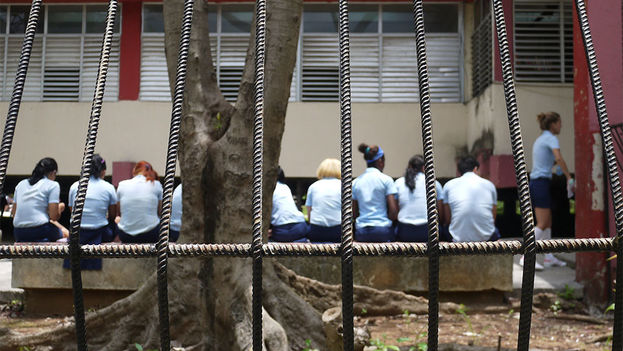
![]() 14ymedio, Zunida Mata, Havana 28 april 2015 — “This is more protected than Plaza of the revolution,” a teenager joked this Monday just before sitting down for the math test for college admission. Yesterday, dozens of schools across the country held the difficult test to enter higher education. The rigor of the evaluation content has increased this year, after a string of cases of fraud that marred last year’s test.
14ymedio, Zunida Mata, Havana 28 april 2015 — “This is more protected than Plaza of the revolution,” a teenager joked this Monday just before sitting down for the math test for college admission. Yesterday, dozens of schools across the country held the difficult test to enter higher education. The rigor of the evaluation content has increased this year, after a string of cases of fraud that marred last year’s test.
The National Committee of Admission and Job Placement of the Ministry of Higher Education made a prior call for “discipline, punctuality and rigor” in order to carry out the process of University admission. This time, control measures have also been reinforced to deliver and protect the sheets containing the admission exams. “The chain of custody has been guaranteed,” a teacher boasted this Monday outside Old Havana High School as she answered the questions of curious parents who gathered at the site in the early hours of the morning.
Rigor has not only been expressed in greater control measures for the distribution of the exams but also in the difficulty of the tests. “They made it a difficult test,” complained a young man at the exit; for him the “math problems were complicated and the equation questions had some kind of trick.” In conversation with 14ymedio, several students expressed their suspicions that the complexity of the examination was intended to serve as a “warning” so that last year’s irregularities wouldn’t happen again.
The Municipal People’s Court of Marianao imposed, last November, heavy penalties for those responsible for leaking tests in the process of higher education admission for the academic year 2014-2015 in the province of Havana. A similar event happened at the Faculty of Medicine of Santiago de Cuba, where second year Anatomy and Statistics tests were leaked along with the fourth year English test and the well-known state test that all sixth year students must cope with.
Teachers and methodologists involved in the scandal were sentenced to from 18 months up to 8 years in prison. During the police investigation, it came out that several of these teachers trained groups of students, without legal authorization, based on the leaked test questions. The figure of the tutor – a teacher privately contracted by families, outside of the schools – has become famous in Cuba to prop up the deterioration of teaching quality in the schools themselves.
The figure of the tutor – a teacher privately contracted by families, outside of the schools – has become famous in Cuba to prop up the deterioration of teaching quality in the schools themselves.
The events led to a new math test held on May 6, 2014, to the modification of the Spanish and history tests and to the “extraordinary repeat test for these three subjects,” as Granma newspaper explained at that time. Repeating the state test and the indefinite invalidation of the diplomas of the medical students involved in the leaking also occurred in Santiago de Cuba.
In order to avoid the repetition of such incidents in yesterday’s math exam, examination sheets were distributed to officials and managers during the weekend in sealed envelopes, requiring a signature to open them. “This year we have managed to avoid that teachers have prior access to questions; only school principals and heads of Departments are allowed to handle the exams”, assured a methodologist from the Playa municipality.
The official press echoed the words of René Sánchez, President of the National Committee on Admission and Work Placement of the Ministry of Higher Education, for whom the current round of testing is characterized by “transparency” and “purity.” As the official explained, we should now add that there is no access “to the fraudulent” in the slogan “The University is for Revolutionaries.”
This year, the majority of university openings correspond to medical, pedagogical, technical and agricultural majors. High School graduates compete for a total of 57,375 spaces in daytime course options and the so-called “encounter courses” – that is courses where students attend classes. Although there are more places than students for the examinations, much of what is offered is not of interest to young people. The pedagogical and agricultural careers are considered among the worst and students foresee them as a road to sacrifice with low wages and little social recognition.
In a few days, once the results of the tests are published, students may request a requalification process of a review of their scores.
The Spanish examination for University admission will be held on 30 April, and on May 4 that of Cuban history. In the meantime, the repeats for all these tests will take place between June 18 to 24.
Translated by Alberto
